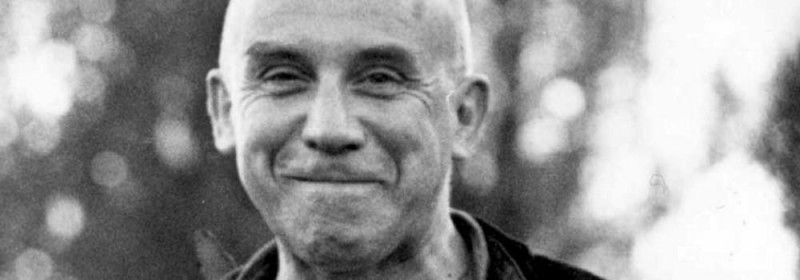The Interior Geography of Merton's Mountain
Tom Sturch
 I had intended to finish Thomas Merton's The Seven Storey Mountain before I wrote this piece, but alas, he makes me think too much, and when I think it yields writing, and writing works on me from the inside out. I think Fr. Merton would be happy with that. In his preface to the Japanese edition published twenty years after its initial release, he says, "I seek to speak to you, in some way, as your own self. Who can tell what this may mean? I myself do not know, but if you listen, things will be said that are perhaps not written in this book. And this will be due not to me but to the One who lives and speaks in both."
I had intended to finish Thomas Merton's The Seven Storey Mountain before I wrote this piece, but alas, he makes me think too much, and when I think it yields writing, and writing works on me from the inside out. I think Fr. Merton would be happy with that. In his preface to the Japanese edition published twenty years after its initial release, he says, "I seek to speak to you, in some way, as your own self. Who can tell what this may mean? I myself do not know, but if you listen, things will be said that are perhaps not written in this book. And this will be due not to me but to the One who lives and speaks in both."
I read as a Protestant with Catholic sympathies, as one who lives in and too often of the world, and as one in a continuing search of the One who speaks. So, when I learned that the title derives from an allusion to Dante's Purgatory and the notion of working one's way through the seven deadly sins into Paradise, my Presbyterian skin bristled. The whole five solae thing, I suppose... But it also compares with L.R. Rambo's seven-step theory of conversion including content, crisis, quest, encounter, interaction, commitment, and transformation.
Whatever it is, there is a self-conscious reversal of geography of his story-telling that demonstrates the delusion of intellectual ascendance and the humiliation of spiritual discovery. After the deaths of his father and close family members, he is sick with what might be compared to Hume's “melancholy of the philosopher.” He moves on to Columbia to study and while happy, becomes suspicious of education. After an illness, he visits monasteries, reads The Divine Comedy and The Spirit of Mediaeval Philosophy and experiences a growing spiritual crisis. At this point, Merton returns to Queens and the Episcopal Church where his father had been the organist. “I think the reason for this was that God wanted me to climb back the way I had fallen down... He wanted me to do away with what there was of pride and self-complacency... He would not let me become a Catholic, having behind me a rejection of another church... [which is an act] sinful in itself, rooted in pride, and expressed in contumely.”
Even in the monastery, Merton matures further into his decision to enter. “The fact that I was hurrying and ran into people only indicates that I was much less of a contemplative than I thought I was.” It comes when his beloved younger brother visits him at The Abbey of Gethsemani that Merton affirms, “Once you have grace, you are free.” He shares Communion with him in this—it would turn out to be their last meeting, as his brother dies in WWII.
In his 1953 The Sign of Jonas, Merton admits he barely recognizes himself in The Seven Storey Mountain, saying, “[It] is the work of a man I have never even heard of.” But I recognize my story in his as it unfolds, though it is in many ways an opposite one. How much of your story is authored by you? How much do you recognize of yours in others? How much in Christ?